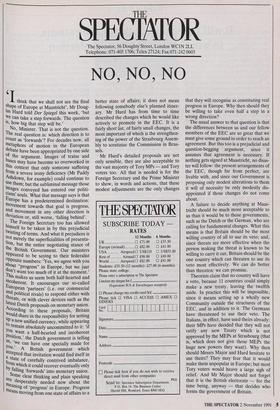The Spectator, 56 Doughty Street, London WC1N 2LL Telephone: 071-405
1706; Telex 27124; Fax 071-242 0603
NO, NO, NO
Ithink that we shall not see the final Shape of Europe at Maastricht', Mr Doug- las Hurd told Der Spiegel this week, tut we can take a step forwards. The question is, how big that step will be.'
No, Minister. That is not the question. The real question is: which direction is to count as 'forwards'? For decades now, all metaphors of motion in the European debate have been appropriated by one side of the argument. Images of trains and buses may have become so overworked in this context that only someone suffering from a severe irony deficiency (Mr Paddy Ashdown, for example) could continue to use them; but the subliminal message those images conveyed has entered our politi- cians' souls. What that message says is that Europe has a predetermined destination: movement towards that goal is progress, and movement in any other direction is deviation or, still worse, 'falling behind'.
The Foreign Secretary too has allowed himself to be taken in by this prejudicial twisting of terms. And what it prejudices is nm merely the superficialities of presenta- tion, but the entire negotiating stance of the British Government. Our ministers appeared to be saying to their federalist oPposite numbers: 'Yes, we agree with you about "Progress" in Europe, but we just don't want too much of it at the moment.' This makes us seem both half-hearted and incoherent. It encourages our so-called European 'partners' (i.e. our commercial and political rivals) to respond either with threats, or with clever devices such as the latest Dutch proposals on monetary union. According to these proposals, Britain would share in the responsibility for setting 1.1P a new unified currency, while appearing to remain absolutely uncommitted to it: 'if You want a half-hearted and incoherent Position,' the Dutch government is telling us, 'we can have one specially made for You.' A British government which accepted that invitation would find itself in ;1r state of carefully contrived imbalance, , °RI which it could recover eventually only uY falling 'forwards' into monetary union. Some clear thinking and plain speaking are desperately needed now about the Meaning of 'progress' in Europe. Progress nieans moving from one state of affairs to a
better state of affairs; it does not mean following somebody else's planned itiner- ary. Mr Hurd has from time to time described the changes which he would like actively to promote in the EEC. It is a fairly short list, of fairly small changes, the most important of which is the strengthen- ing of the power of the Strasbourg Assem- bly to scrutinise the Commission in Brus- sels.
Mr Hurd's detailed proposals are not only sensible, they are also acceptable to the vast majority of Tory MPs — and Tory voters too. All that is needed is for the Foreign Secretary and the Prime Minister to show, in words and actions, that these modest adjustments are the only changes that they will recognise as constituting real progress in Europe. Why then should they be willing to take even half a step in a wrong direction?
The usual answer to that question is that the differences between us and our fellow members of the EEC are so great that we must give some ground in order to reach an agreement. But this too is a prejudicial and question-begging argument, since it assumes that agreement is necessary. If nothing gets signed at Maastricht, no disas- ter will follow: the present arrangements of the EEC, though far from perfect, are livable with, and since our Government is proposing only modest alterations to them it will of necessity be only modestly dis- appointed if those changes do not come about.
A failure to decide anything at Maas- tricht should be much more acceptable to us than it would be to those governments, such as the Dutch or the German, who are calling for fundamental changes. What this means is that Britain should be the most willing country of all to use its veto; and, since threats are more effective when the person making the threat is known to be willing to carry it out, Britain should be the one country which can threaten to use its veto most effectively. We can do better than threaten: we can promise.
Theorists claim that no country will have a veto, because 11 countries could simply make a new treaty, leaving the twelfth aside. In practice this will be impossible, since it means setting up a wholly new Community outside the structures of the EEC, and in addition to it. The Germans have threatened to use their veto. The Italians, in effect, have used theirs already: their MPs have decided that they will not ratify any new Treaty which is not approved by the MEPs at Strasbourg (that is, which does not give those MEPs the huge new powers they want). Why then should Messrs Major and Hurd hesitate to use theirs? They may fear that it would make them unpopular in Europe; but most Tory voters would heave a large sigh of relief. And Mr Major should not forget that it is the British electorate — for the time being, anyway — that decides who forms the government of Britain.


































































 Previous page
Previous page